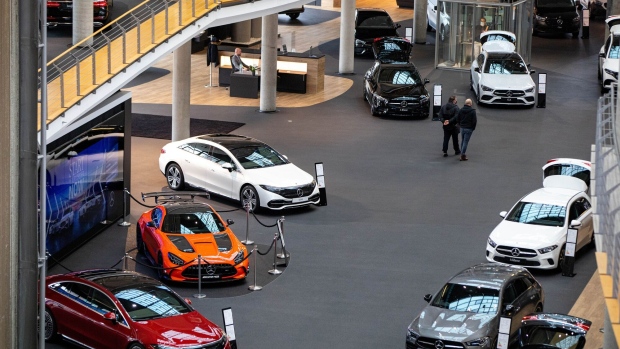Oct 26, 2023
Mercedes Sees Profit Margin Pressure on Weakening Economy
, Bloomberg News

(Bloomberg) -- The slowing global economy has started to catch up with the likes of Mercedes-Benz Group AG and Volkswagen AG, after pent-up demand gives way to the reality of surging interest rates and high inflation.
Mercedes on Thursday reported a drop in third-quarter margins from a year ago after average car prices declined and inflation fanned the cost of everything from components to labor. Volkswagen said it’s redoubling efforts on cost savings after disappointing results that saw returns sag at its namesake brand.
Mercedes fell the most since May in Frankfurt trading with shares declining 5.8% so far this year. Volkswagen also dropped alongside French auto supplier Compagnie Plastic Omnium SE slumping 20% after cutting its full-year outlook on the back of high inflation and slower EV output.
Pricing competition on electric vehicles is “brutal,” Mercedes Chief Financial Officer Harald Wilhelm said on a media call. “The current environment is not healthy and sustainable going forward.”
The decline spreading to premium brands like Mercedes and Porsche AG indicates even luxury buyers are growing more reticent as inflation remains high despite the surge in interest rates. The maker of the 911 sports car this week said it expected a challenging year ahead because of rising geopolitical tensions and a slowdown in China.
Read more: Wider War in Middle East Could Tip World Economy Into Recession
As part of a broader shift, Mercedes is directing resources to its most expensive vehicles, including Maybach limousines, AMG performance cars and the G-Wagon off-roader, and away from less profitable entry-level models like the compact A-Class. Average prices for its cars slipped to €74,600 ($78,640) from €75,400 a year ago.
Slower growth underscores efforts for savings, with VW saying it plans to implement a broad saving push within weeks. At the VW brand, higher costs dragged third-quarter returns to 3.4%, adding urgency to drive forward plans to lift long-term margins to 6.5% by 2026 — equating to a sustained gain in earnings of about €10 billion.
The company, which said third-quarter performance fell short, is honing in on productivity not only at the VW brand but across its stable of mass-market nameplates that include Skoda and Seat, Chief Financial Officer Arno Antlitz said on a call.
“We mustn’t underestimate the huge potential that the brand croup core has in terms of synergies, in terms of joint R&D and in terms of production,” Antlitz said.
Returns at VW’s Audi brand, its major profit center, also fell on the back of higher costs and lower residual values. Margins during the first nine months of the year dropped to 9.1% from 14.1% a year ago. Across the group, logistics problems are hampering delivery of finished vehicles, an issue that’s crimping cash flow and adding costs, he said.
--With assistance from Oliver Crook.
(Updates with VW CFO comment in eighth paragraph)
©2023 Bloomberg L.P.


